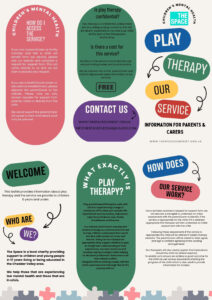Primary Aged Play Therapy
The Space offers a counselling service to young people aged 9-17 years. This is usually undertaken via face to face but we can offer telephone or on-line counselling if this is more suited to our clients’ needs. Before we tell you how to access this the information below provides information to help you decide if this service is suitable for you or if a parent/carer suitable for your child/young person.
What is counselling and play therapy?
Counselling and play therapy give children and young people a safe and confidential space to talk about any worries or problems they are experiencing. This can range from family challenges, behaviour, stress, bereavement and feeling anxious about situations. Talking things through in a safe setting, with regular appointments over a specific period can help a child or young person to gain new and different perspectives. This often leads to changes in how they feel about themselves, their relationships, the way they think and behave.
Our Play Therapists work with children usually under the age of 8 years, suffering from a range of psychological difficulties and complex life experiences – including depression, anxiety, ADHD, experience of abuse, grief, family breakdown, domestic violence, and trauma. Our professionally trained Therapists works to help your child to gain insight and understanding of their experiences, increasing emotional resilience, and developing coping strategies while decreasing problematic behaviours and internalized conflict.
How does counselling/play therapy work?
Having thoughts, feelings and fears listened to, explained, or understood by someone who is not directly involved in their life proves hugely beneficial. We know that children and young people value and benefit having a confidential setting and a regular time to talk. This helps to form and build a trusting relationship with their Counsellor or Therapist which helps the child or young person to better understand themselves. Counselling can also enable young people to see other options for moving forwards and with help access support from others if they need it. Sometimes just ‘talking things through’ with a Counsellor can help young people to feel clearer or more confident about putting into action something they had in mind already.
Play therapists use play as a communication tool to help children understand their world and deal with emotional distress and trauma
What does a counsellor/play therapist do?
The Space counsellors and therapists are qualified and trained to listen and understand children and young people; to see things from their viewpoint. As well as listening, they also help children and young people to explain their problems or challenges, see patterns in their thinking and/or behaviour and support them to make positive changes if that is what they want. It is important to note that the counsellor’s role is not to give advice or tell young people what to do – their role is to help young people to make their own choices to help equip themselves with tools to cope and build resilience.
Play therapy Play is a child’s natural way of experimenting, learning, rehearsing, and mixing real with fantasy. It is an integral part of childhood development across physical and cognitive domains and is a vital part of all our lives whatever our age.
Using play as the medium to express themselves and what they are experiencing, makes sense to children. Children can play what they struggle to say, children can play to explain their way. Through play children can discover and rehearse different ways of understanding and coping with difficult feelings, leading to a healthier and happier way of being. (PTUK)
Who can come to counselling/play therapy?
Our service is open to all young people aged 4-17 years living or being educated in the Cheddar Valley area.
Is counselling/play therapy confidential?
Yes, however there are exceptional circumstances when confidentiality needs to be broken and this is clearly explained to the child (parent/carer) or young person at the start of any counselling/therapy relationship.
Confidentiality will be broken if the practitioner believes that a child or young person is at significant risk of harm to either themselves or others. In these situations, the Counsellor/Therapist will speak to the Space’s Designated Safeguarding Lead (DSL). If we are supporting a child or young person in a school setting, we will immediately report a concern the school’s Designated Safeguarding Lead or Deputy who will take the necessary action.
What should you do if you think you or if you or if you are a parent/carer that feels you/your child or young person may benefit from counselling or play therapy?
Is there a cost to this service?
To remain sustainable, we suggest a contribution of £15 per session, (though the actual cost is £45). If this amount is difficult, please contact us to discuss options. Higher contributions are appreciated and help support our ongoing work.
We also depend on funding bodies that require us to demonstrate the impact of our services on young people. To provide this information, we ask children/young people, and where appropriate, parents/carers, to assist by completing surveys during the counselling period and a case study at the end, if they are willing.
As our services are in high demand, we have a clear policy regarding unattended sessions, which will be explained by the counsellor at the beginning of counselling.
How long is the counselling/play therapy period and when and where do the sessions take place?
With our counselling service we offer young people a maximum of nine sessions to take place weekly for around 45 minutes per session.
Play therapy designed for the younger child (4-8) will consist of 12 sessions in total.
When providing face to face sessions we us various venues e.g. schools and local venues but we always use a private, designated room. For our telephone and on-line counselling, we will advise the young person how to keep the discussion safe.
